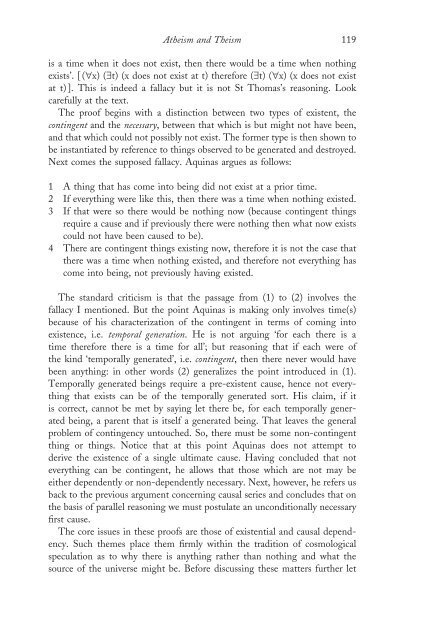Atheism and Theism JJ Haldane - Common Sense Atheism
Atheism and Theism JJ Haldane - Common Sense Atheism
Atheism and Theism JJ Haldane - Common Sense Atheism
Create successful ePaper yourself
Turn your PDF publications into a flip-book with our unique Google optimized e-Paper software.
<strong>Atheism</strong> <strong>and</strong> <strong>Theism</strong> 119<br />
is a time when it does not exist, then there would be a time when nothing<br />
exists’. [(∀x) (∃t) (x does not exist at t) therefore (∃t) (∀x) (x does not exist<br />
at t)]. This is indeed a fallacy but it is not St Thomas’s reasoning. Look<br />
carefully at the text.<br />
The proof begins with a distinction between two types of existent, the<br />
contingent <strong>and</strong> the necessary, between that which is but might not have been,<br />
<strong>and</strong> that which could not possibly not exist. The former type is then shown to<br />
be instantiated by reference to things observed to be generated <strong>and</strong> destroyed.<br />
Next comes the supposed fallacy. Aquinas argues as follows:<br />
1 A thing that has come into being did not exist at a prior time.<br />
2 If everything were like this, then there was a time when nothing existed.<br />
3 If that were so there would be nothing now (because contingent things<br />
require a cause <strong>and</strong> if previously there were nothing then what now exists<br />
could not have been caused to be).<br />
4 There are contingent things existing now, therefore it is not the case that<br />
there was a time when nothing existed, <strong>and</strong> therefore not everything has<br />
come into being, not previously having existed.<br />
The st<strong>and</strong>ard criticism is that the passage from (1) to (2) involves the<br />
fallacy I mentioned. But the point Aquinas is making only involves time(s)<br />
because of his characterization of the contingent in terms of coming into<br />
existence, i.e. temporal generation. He is not arguing ‘for each there is a<br />
time therefore there is a time for all’; but reasoning that if each were of<br />
the kind ‘temporally generated’, i.e. contingent, then there never would have<br />
been anything: in other words (2) generalizes the point introduced in (1).<br />
Temporally generated beings require a pre-existent cause, hence not everything<br />
that exists can be of the temporally generated sort. His claim, if it<br />
is correct, cannot be met by saying let there be, for each temporally generated<br />
being, a parent that is itself a generated being. That leaves the general<br />
problem of contingency untouched. So, there must be some non-contingent<br />
thing or things. Notice that at this point Aquinas does not attempt to<br />
derive the existence of a single ultimate cause. Having concluded that not<br />
everything can be contingent, he allows that those which are not may be<br />
either dependently or non-dependently necessary. Next, however, he refers us<br />
back to the previous argument concerning causal series <strong>and</strong> concludes that on<br />
the basis of parallel reasoning we must postulate an unconditionally necessary<br />
first cause.<br />
The core issues in these proofs are those of existential <strong>and</strong> causal dependency.<br />
Such themes place them firmly within the tradition of cosmological<br />
speculation as to why there is anything rather than nothing <strong>and</strong> what the<br />
source of the universe might be. Before discussing these matters further let

















